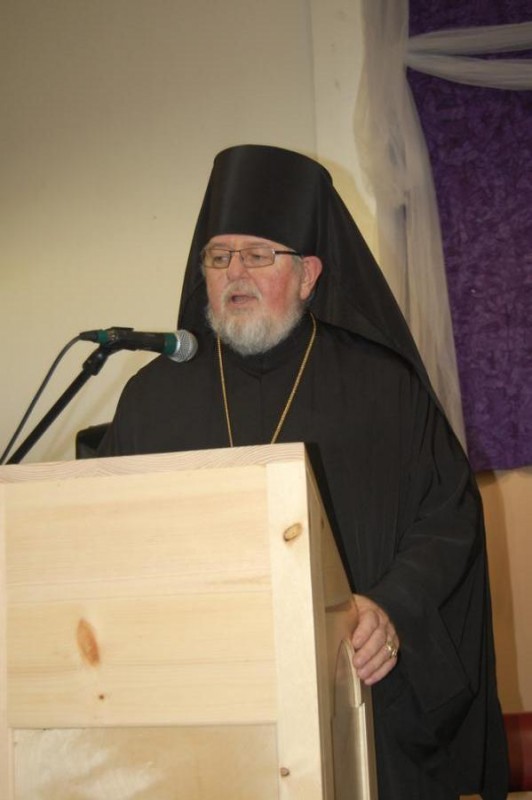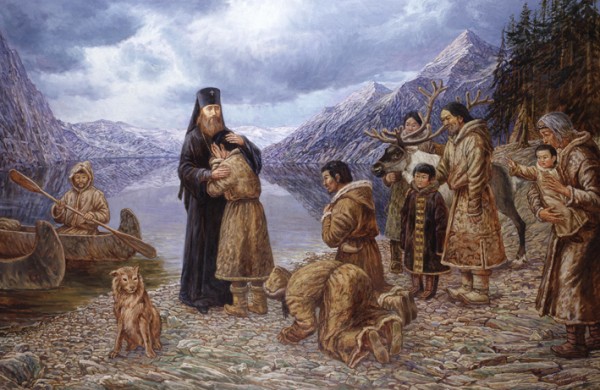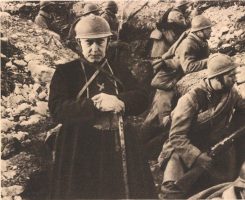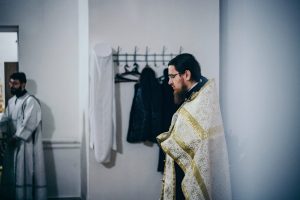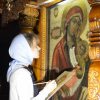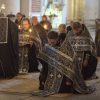Today we gather here to offer to the world our most recent class of “Slaves for Christ”, the Priest Simeon, the Priest Jason, and the Deacon Michael. We honor their work and success while at St. Herman’s Seminary and confer on them our awards for completion of the program of priestly formation. This is a right and proper thing for us to do; but it is also more of a beginning than a completion, for their labors for Christ are only now beginning. Armed with the tools of education, Liturgy and Scripture, they now set out, like new missionaries, into the “field ripe with harvest” that Christ has prepared for them.
So I would like to take a little time and talk about what awaits them. I will do this in three ways, by telling several small stories, sharing a few Scripture verses, and giving them examples to consider as they minister to the world.
Believe it or not, St. Herman and companions from Valaam Monastery were not the first monastics chosen to come to America by the Russian Church. The first monastics chosen were two monks of the Sarov Monastery. In 1789 Metropolitan Gabriel asked the monk Iakov and Hieromonk Joachim. There are no records about the Monk Iakov, but Hieromonk Joachim we do have records and it seems this hieromonk decided to decline the appointment and acted as a “fool for Christ” to avoid being sent to America. The Abbot of Sarov Monastery, Pakhomii received what follows in a letter from Metropolitan Gabriel:
“Having read your letter, I am shocked. Father Joachim, who is worthy of Christian love, behaves this way, as you write, in order to save himself. But he who does not want to aid in the salvation of others, is not saving himself.
Humility, which he always preserves in his soul, will rise up, when, having been called to the salvation of many, he will be like a slave and servant.
I ask you to admonish him in the name of Jesus Christ, who took the sins of the entire world, that he follow in His footsteps. He came into the world to a throng of corrupt people, so that He could save them. Surely he does not think this example is not worthy of imitation? Does he say that we have no strength and are weak? The Apostle Paul said this, but then he confessed: “yet not I, but the grace of God which is in me” (I Cor. 15:10)
Christ is calling him; grace awaits him, so that he can work with it. Let him consider, what a great transgression this is – to make your ears deaf to the call of Jesus Christ.”
Now, let us consider what has been said here. Metropolitan Gabriel has rightly recognized the danger that Hieromonk Joachim puts himself in by refusing his calling. But he who does not want to aid in the salvation of others, is not saving himself. Anyone who accepts the call to serve God by coming to a seminary should recognize that this is his first and most important realization about his or her own salvation; if we do not first understand it is about bringing the Good News of Christ’s message of Salvation to others, we can in no way think we will be saved.
Next, he reminds the Abbot that Jesus came to a “throng of corrupt people, so that He could save them”. Surely he does not think this example is not worthy of imitation? The double negative is a bit had to follow, but the point is that Jesus had to deal with some of the most unholy and corrupt individuals in His time, is this not worthy for us to also follow and do, to save people, the corrupt and the incorrupt, the evil and the good, the unrighteous and the righteous from their sins? Indeed, it is our second important task.
Finally, what beautiful words Gabriel uses in his final plea, “Christ is calling him; grace awaits him, so that he can work with it.” The Grace of Christ is there for all of us who come to seminary to use, so WE can work with it. The Grace of Christ is always offered to us freely, and bestowed upon the clergy in a special way, so that their work is the work of another Christ, not of themselves. Otherwise, we face the transgression of “making our ears deaf to the call of Jesus Christ.”
In 1804, a new priest monk was sent to be head of the mission in Kodiak. His name was Hieromonk Gideon. He took his missionary duties seriously, immediately setting out by baidarka to the Kodiak settlements, during this one trip he baptized 28 people, served 38 marriages, and nearly drowned when his baidarka sank before returning to Kodiak. After re-establishing the school, improving the life of the monks, caring for the children and doing his best to bring the Gospel to Russians and Americans alike, he left for Kamchatka and St. Petersburg in 1807.
He wrote a letter to Baranov informing him that Father Herman would be in charge of the mission. It this letter he makes some notable comments about St. Herman, telling Baranov,
“I earnestly admit to you, that in this selection I am comforted and reassured by the fact that I very often had the pleasure of hearing your Honor greatly praise this peace-loving elder who is overflowing with meekness, calmness and humble wisdom … This praise is more important for him than any other praise.”
St. Herman never needed to tell people what a good person he was, he never needed to speak about his own endeavors or accomplishments, yet his simple, loving and peaceful life were acknowledged by everyone. If a priest needs to think about what people think if him, then here is your example, be meek, be calm, use humble wisdom and God will give you the praise through the mouths of those whose lives you touch.
In a note to St. Herman when he left, Hieromonk Gideon gives him his thoughts, his advice, on how best to take up his role in leadership. Fr. Gideon knew who he was talking to, he knew his humble style, he knew his simple but eloquent speech, and so he speaks to him accordingly.
“I am sustained by the gratifying hope that you will not neglect to inculcate in the hearts of the Russians and Americans the rules of piety, Christian charity, and friendly ties among both groups using your well-tested exhortations. You know that the first responsibility of clergy is to give an example of Christian sanctity in their own lives; I do not doubt but that you will properly guide them in this way. The particular task before your Reverence is to see that everyone, in whatever responsibility he has, carries it out in a conscientious, honest, and God-pleasing manner.”
We often ask ourselves what is the best way for me to act so that people will understand that I am a priest of the Orthodox Christian Church? Fr. Gideon has given us the best answer. Be an example of Christian Sanctity in our own lives. See to it that everyone carries out their responsibilities in a conscientious, honest and God-pleasing manner. They are given unto your care for this purpose; not to please you, not to do your work for you, not to simply listen to you tell them the “rules” of the Bible and Christian Doctrine, but to follow your example, so make it a good one to follow.
Next, I would like to give you two verses of Holy Scripture that I feel are the two most important passages for othe Christian life. One could site many verses as important, and I do not imply by my words to desire you to think less of any other passage of Scripture, but only that these two have a special value for me. The first one comes from St. Paul’s Epistle to the Philippians, and it is read on Palm Sunday. Near the end of the reading of Philippians Chapter 4 on that Sunday, St. Paul says,
“Finally, brethren, whatever is true, whatever is honorable, whatever is just, whatever is pure, whatever is lovely, whatever is gracious, if there is any excellence, if there is anything worthy of praise, think about these things.”
Our graduates leave here today to go out into God’s vineyard to labor for the Truth of the Gospel; so they must look for whatever is true, honorable, just, pure, lovely, gracious, excellent and worthy of praise. And where will they find these things? That is the real question! When St. Paul gave this exhortation to the Philippians, did he tell them where they would find them? The answer is we shall find them wherever we look for them, in the hearts of those who are made in the image of God, it is our duty to seek those properties out and develop them, for they are already there, planted in the creation of each creature Whom He made.
[Phl 4:1-8 RSV] 1 Therefore, my brethren, whom I love and long for, my joy and crown, stand firm thus in the Lord, my beloved. 2 I entreat Eu-o’dia and I entreat Syn’tyche to agree in the Lord. 3 And I ask you also, true yokefellow, help these women, for they have labored side by side with me in the gospel together with Clement and the rest of my fellow workers, whose names are in the book of life. 4 Rejoice in the Lord always; again I will say, Rejoice. 5 Let all men know your forbearance. The Lord is at hand. 6 Have no anxiety about anything, but in everything by prayer and supplication with thanksgiving let your requests be made known to God. 7 And the peace of God, which passes all understanding, will keep your hearts and your minds in Christ Jesus. 8 Finally, brethren, whatever is true, whatever is honorable, whatever is just, whatever is pure, whatever is lovely, whatever is gracious, if there is any excellence, if there is anything worthy of praise, think about these things.
Notice in this passage also two other significant points. There was evidently a disagreement between two people in Philippi that St. paul knew about, and he is not afraid to tell them both to stop their division and come to an agreement. Eudoia and Synclitica, two women I might add (rather dangerously), concerned St. Paul enough to care and seek their overcoming of difference; this is the calling of every clergyman, to heal the wounds of life whenever he can.
The other telling comment by St. Paul leads me to my final comment on Scripture. He says “Have no anxiety about anything”. Anything? Everything? Nothing? Yes, no anxiety at all. If you think this is an easy thing to do, you are either without any wits at all, or you are already dead and don’t know it. We are always troubled by life, its problems, its trials, and its tensions. We are constantly occupying our time thinking about things which we cannot do anything about. Christ put this in the most perfect way when He instructed us in the Sermon on the Mount, where my very favorite verse is mentioned, Matthew Chapter six, verse thirty-three and thirty-four, “But seek first his kingdom and his righteousness, and all these things shall be yours as well. Therefore do not be anxious about tomorrow, for tomorrow will be anxious for itself. Let the day’s own trouble be sufficient for the day.” [Mat 6:33-34 RSV] This is what follows the passage about not being concerned about what you wear, or what to eat, because God knows what we need. Therefore, I say again, especially to our graduates, but to all of us as well, do what God intends you to do and have Faith, and He will take care of the rest. The opposite is also true, worry about every little thing in life, and you will lose your faith and then you will lose God, and no one will follow anyone who does not have God in his heart.
And finally, let me show you the world into which you must minister, to which you must shine that “light of Christ” that has been planted within you. Archimandrite Sophrony was born in Tsarist Russia in 1896 to Orthodox parents. He studied at the Orthodox Institute of Theology in Paris after WWI, and eventually found himself on Mount Athos learning at the feet of the famous Staretz Silouan. Theproduct of his life of comtemplation and prayer is a wonderful work entitled, “His Live is Mine”. In that book are many good and carefully crafted spiritual pearls of wisdom. Two of them stand out to me now as reference points for our latest class of graduates, and indeed for all of us to ponder and obtain wisdom.
Modern science has neglected the importance of God in the creation of the universe. It ignores that most famous passage of Scripture we read every Paschal Liturgy, “In the beginning was the Word…All things were mady by Him … In Him was life”. Fr. Sophrony says,
“contemporary science postulates that in the beginning was hydrogen and from this atom, by an evolutionary process over milliards of years, everything else developed. The scientific principle – the objectification of the cosmos together with objective knowledge – is applicable only where the laws of nature prevail absolutely. It is not clear on what basis many scientists reject the possibility of other forms of being – of free, non-determined being. We know that Primordial Being lies outside the preserves of science, which can tell us nothing of the meaning of our existence.”
Now, what he is saying is this, when you take nature only as nature, looking at its beauty, its grandeur and its meaning as something figured out by measurement, weight color, space and time, you don’t really know very much about it other than facts. But those facts point to something else, and the world has stopped looking beyond those facts to find its reason for existing, and it cannot answer that question of being with only those facts; it takes a look beyond those facts to the creator of that beauty of nature to discover why it is there, and why we are here to behold it. Never be satisfied with just the facts of life, always look beyond them to find the meaning why they exist, look for the source of creation and you will discover your answers for life, and those answers will be found in Christ.
The other important presentation in Archimandrite Sophrony’s work is what he calls the “Tragedy of Man”. He said,
“The tragedy of our times lies in our almost complete unawareness or unmindfulness, that there are two kingdoms, the temporal and the eternal. We would build the Kingdom of Heaven on earth, rejecting all idea of the resurrection or eternity. Resurrection is a myth. God is dead. This is the tragedy that the Church of Christ fights against with every fibre of its being. It is why we begin each Divine Liturgy with “Blessed is the Kingdom”, for our journey in life is one that leads us ultimately to that Kingdom. But the duty of every priest is to work to bring that Kingdom to us now, to taste it, to feel it, to touch it, to hear it, and thereby know that this temporal kingdom does not compare to the glory we will share in the Eternal Kingdom. It is the duty of every one of us, as much as we are able, to show that Kingdom to those around us. To share it with others, for it is not a personal possession as some would have us think, but a Kingdom that only exists in Communion with all Created things, not only with others who, like us, share in the Image of God, but with every creature, every winged bird and every fish of the sea, and every single blade of grass. It is all there to commune with in a theistic manner, a God-centered manner which can only be experienced when we our alive in Christ, when “His life is Mine”.
May we all seek that God-centered, Christ—centered existence that says to everyone, “His Life is Mine”. Amen.












